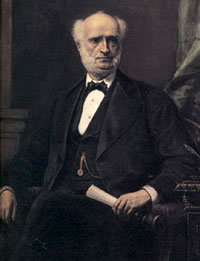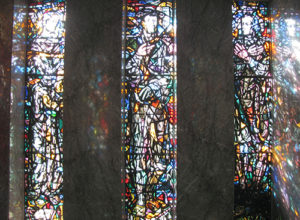 McMaster Divinity College is heir to an educational tradition that reaches back to 1838, when a Scots pastor named John Gilmour founded Canada Baptist College in the then commercial centre of Canada, Montreal. At the heart of the College was the theological curriculum. Unfortunately, circumstances led to the closing of the college in 1849.
McMaster Divinity College is heir to an educational tradition that reaches back to 1838, when a Scots pastor named John Gilmour founded Canada Baptist College in the then commercial centre of Canada, Montreal. At the heart of the College was the theological curriculum. Unfortunately, circumstances led to the closing of the college in 1849.
Eight years after the demise of the Montreal school, one of its Principals, Robert Alexander Fyfe, a Toronto pastor, became one of the leading advocates of the voluntary system of support for denominational schools. He favoured a Baptist college affiliated with a national nonsectarian university. In 1857, he and prominent Baptists established the Canadian Literary Institute at Woodstock in southern Ontario.
In 1881, William McMaster, a wealthy merchant, banker, and Senator of the Dominion of Canada, urged the creation of a theological school related to Woodstock, but situated in the city of Toronto. McMaster was generous in his financial support of the new school, Toronto Baptist College. The College prospered with a growing student body and a useful affiliation with the University of Toronto. Essentially a theological school that stressed the missionary and pastoral labours of its students, the College enjoyed impressive facilities, now the Royal Conservatory of Music, provided by the Senator on Bloor St.
Through a series of agreements with Baptist interests in Woodstock, plus a new commitment of funds from Senator McMaster, Toronto Baptist College secured from the Ontario Legislature in 1887 a charter for an independent Christian university. The new school incorporated the arts and sciences with the training of ministers. The name McMaster was adopted in honour of the chief benefactor, who died suddenly in 1888, leaving one of the largest bequests to an educational institution in Victorian Canada.
The University was persuaded in 1928 that the City of Hamilton afforded a better environment for McMaster University than Toronto. Thus the University of some four hundred students and its theological faculty of five moved to new facilities on Hamilton’s west end bordering Coote’s Paradise and the Niagara escarpment.
McMaster University was reorganized in 1957 allowing for governance of the institution to pass from the Canadian Baptists of Ontario and Quebec (CBOQ) to a privately-chartered, publicly-funded arrangement. The theological program was transformed into McMaster Divinity College, a separately-chartered affiliate College of the University with its own degree-granting powers, although the Faculty of Theology remains in name, with selected faculty members of McMaster Divinity College appointed to it. With its own Senate and Board of Trustees, McMaster Divinity College is situated at the heart of the McMaster University campus, sharing in its rich learning resources.
In 1960, with the help of donors and churches across Canada, McMaster Divinity College erected new facilities. These include a beautiful chapel, whose internal appointments, including numerous stone and wood carvings were designed by the renowned artist William McElcheran. This chapel later was dedicated in memory of the first McMaster Divinity College Principal, Nathaniel H. Parker (1898-1982). Just outside the chapel is the Matthews Memorial Tower, dedicated to the memory of The Honourable Albert Matthews (1873-1949), prominent Baptist layperson, long-time Chair of the Board of Governors of McMaster University, and generous benefactor of the institution. The tower’s stained-glass windows were designed by Ms. Yvonne Williams of Toronto.
McMaster was among the first Canadian universities to admit women, the first to confer a theological degree upon a woman, and the first to have a woman professor.
One of the major transformations in the life of McMaster Divinity College began in the 1980s, when some members of the Baptist Convention expressed concern regarding the general liberal theology of the College. They instigated a process that resulted in a major theological shift, whereby McMaster Divinity College has come to be one of the premier evangelical seminaries in Canada. In addition to all of the faculty being actively evangelical, MDC is a member of the Evangelical Fellowship of Canada, an active supporter of Christian Higher Education Canada, and the President is a member of the Fellowship of Evangelical Seminary Presidents.
In 1989, members of the Hurlburt family established the George F. Hurlburt Chair in Preaching, the first fully-endowed Chair at McMaster University or McMaster Divinity College. The purpose of this professorship is to elevate the office and gift of preaching in Christian ministry. The Hurlburt professorship also supports continuing education for those in ministry and has become the most distinguished Chair of its kind in Canada.
A second endowed Chair was inaugurated in 1990, the Centenary Chair in World Christianity. This Chair honours the one-hundredth anniversary of the founding of McMaster University with funds made possible by friends and churches of the CBOQ. The Centenary Chair currently supports work by McMaster Divinity College in the area of globalization of the Christian faith.
In 1995, a third endowed Chair was established, the J. Gordon and Margaret Warnock Jones Chair in Church and Ministry. This was made possible by gifts of the family of J. Gordon Jones, Dr. and Mrs. Edwin Howes, and others. The chair encompasses the work of pastoral ministry and the church in its various settings.
The Ministry Formation program – an integral part of ministerial preparation in the M.Div. degree, and an option for M.T.S. students – was endowed in 1997, with the institution of the Garbutt F. Smith Director of Field Education and Clinical Programs. McMaster Divinity College has been a leader in developing a supervised ministry formation program.
In 1999, the Howard and Shirley Bentall Chair in Evangelical Thought was created by the generosity of the Rev. Dr. Howard and Dr. Shirley Bentall of West Vancouver, British Columbia. The endowment supports a full-time faculty position in theology, systematic theology, and other fields related to the general discipline of theology.
In 2002, the latest of the endowed Chairs of McMaster Divinity College was established through the estate of a generous benefactor. This benefactor had a genuine concern for the church confronting the major ethical issues of our day, and provides for the teaching of a Christian worldview across the curriculum.
We are excited about where God is leading us in the future. We hope that this history conveys a sense of our continuing to move forward under the guidance of God’s Spirit, as we strive to develop effective, evangelical Christian leaders, just as our predecessors trained leaders for their day and age.

